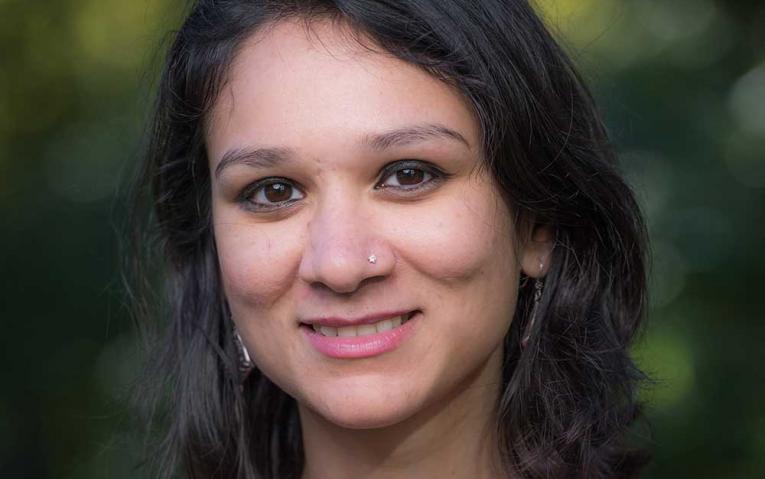
Barnini Bhattacharyya
Doctor of Philosophy in Business Administration in Organizational Behaviour (PhD)
Research Topic
An Intersectional Study of the Invisibility of Women of Colour
It's Supervisor Appreciation Week and I have to mention how grateful I am for my #greatsupervisor Dr. Jennifer Berdahl @JBerdahl at @UBC who keeps me motivated and energized. So lucky to leave our meetings always feeling good!
Dissertations completed in 2010 or later are listed below. Please note that there is a 6-12 month delay to add the latest dissertations.
In recent years, allyship has been lauded as a solution to support marginalized individuals and dismantle oppressive structures, illustrated by increasing discourse around being a “good ally” in workplaces. While allyship research suggests having work allies can help marginalized employees such as women of color navigate the workplace, traditional allyship scholarship has tended to frame allyship as a general set of overarching behaviours without delineating the nuances of different forms of ally behaviours. Further, allyship has been defined as a relationship between a marginalized person and a demographically dissimilar individual with a dominant identity who advocates on behalf of the marginalized person. This definition may not reflect the reality of marginalized group members as it does not explain how they forge beneficial ally relationships within or outside of their social groups, especially with members of other marginalized groups. Integrating scholarship on positive relationships at work (PRW) with critical intersectional perspectives on allies for women of color, I examine allyship from a relational perspective to uncover what constitutes a “good ally” and what kind of allyships women of color forge at work. Through an inductive qualitative examination of allyship using interviews with 30 dyads of women of color and their workplace allies (for a total of 60 informants), I provide a framework of intersectional allyship that challenges traditional notions of allyship and moves our understanding forward by proposing four key dimensions of allyship behaviours and three types of allied relationships at work. This framework also explicates gaps that exist between allyships expected by women of color vis-à-vis allyship as enacted by allies, thus highlighting challenges in allied practices and relationships.
View record
Like many occupations, police officers are facing rising public distrust of their occupation, a trend that has recently significantly worsened due to allegations of misconduct and widespread protests against police practices. Past research suggests occupational members respond uniformly and defensively to these types of external threats. However, in practice, we also see examples of occupational members acknowledging the validity of public distrust and the need for change. The current research explains these divergent responses, revealing why some members are more responsive to external threats from the public. Drawing on qualitative field data including interviews, observation, and archival documents, the findings demonstrate that police officers respond differently to felt public distrust depending on the type of relational frame they apply to understand their relationship as an officer to the public: the autonomous frame or the cooperative frame. The autonomous frame was associated with the occupation’s past, while the cooperative frame represented a new way of relating to the public. Officers’ relational frames were informed by the extent to which some officers experienced “occupational misfit.” Occupational (mis)fit describes a feeling of (mis)alignment based on the felt overlap between the individual’s own social identities (e.g., male, heterosexual, white, etc.) and the social identities figuratively associated with the occupation. Officers’ relational frames in turn served as a lens guiding their cognitive, affective, and behavioral responses to rising felt public distrust with implications for the ongoing relationship between the occupation and the public. This study contributes to the literature on occupational identity, diversity, and fit.
View record
Recognition has grown that moral behavior (e.g., generosity) plays a role in status attainment, yet it remains unclear how, why, and when demonstrating moral characteristics enhances status. Drawing on philosophy, anthropology, psychology, and organizational behavior, I critically review a third route to attaining status: virtue, and propose a moral virtue theory of status attainment to provide a generalized account of the role of morality in status attainment. The moral virtue theory posits that acts of virtue elicit feelings of warmth and admiration (for virtue), and willing deference, towards the virtuous actor. I further consider how the scope and priority of moralities and virtues endorsed by a moral community are bound by culture to affect which moral characteristics enhance status. In particular, I theorize that virtues pertaining to community (e.g., humility) and divinity (e.g., cleanliness) are more effective to attain status in collectivistic cultures; whereas virtues pertaining to autonomy (e.g., rights) are more effective to attain status in individualistic cultures. Four experimental studies were conducted to examine the proposed theory. Studies 1 to 3 found that demonstrating a variety of virtues, including humility, cleanliness, and (advocating for human) rights, elicited admiration for virtue, which in turn led a virtuous actor to attain status. Expressing humility and cleanliness was more effective in attaining status in a collectivistic culture (India) than in an individualistic culture (the U.S.). Importantly, the positive impact of virtues on status attainment generally did not depend on the virtuous actor’s levels of competence. Study 4 showed that expressing humility led people to see the humble actor as a more desirable leader and to be influenced by the humble actor in a collaborative cognitive task. Humility and cultural self-construals interacted to affect the actor’s status through admiration for virtue. Specifically, individuals with high interdependent self-construals admired humility to a greater degree than those with low interdependent self-construals, which in turn led them to confer higher status to the humble actor. These findings provide initial empirical support for the moral virtue theory of status attainment. Implications for theory, research, and organizational applications are discussed.
View record
If this is your researcher profile you can log in to the Faculty & Staff portal to update your details and provide recruitment preferences.